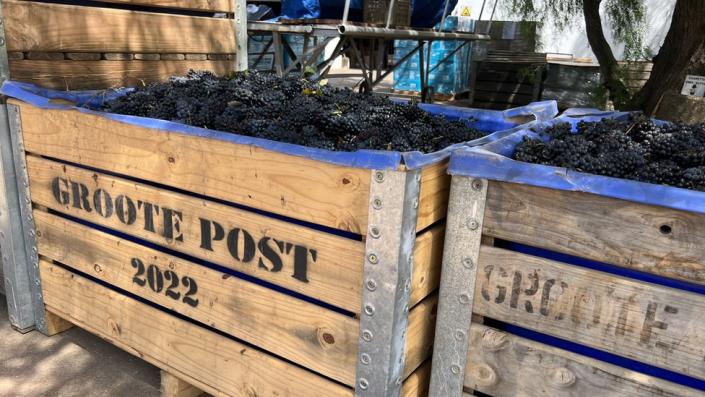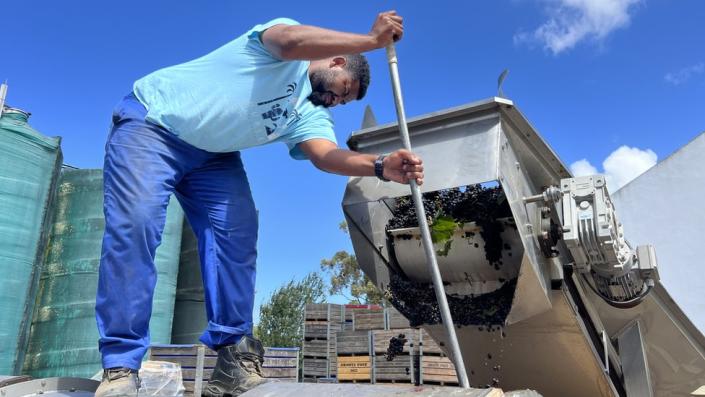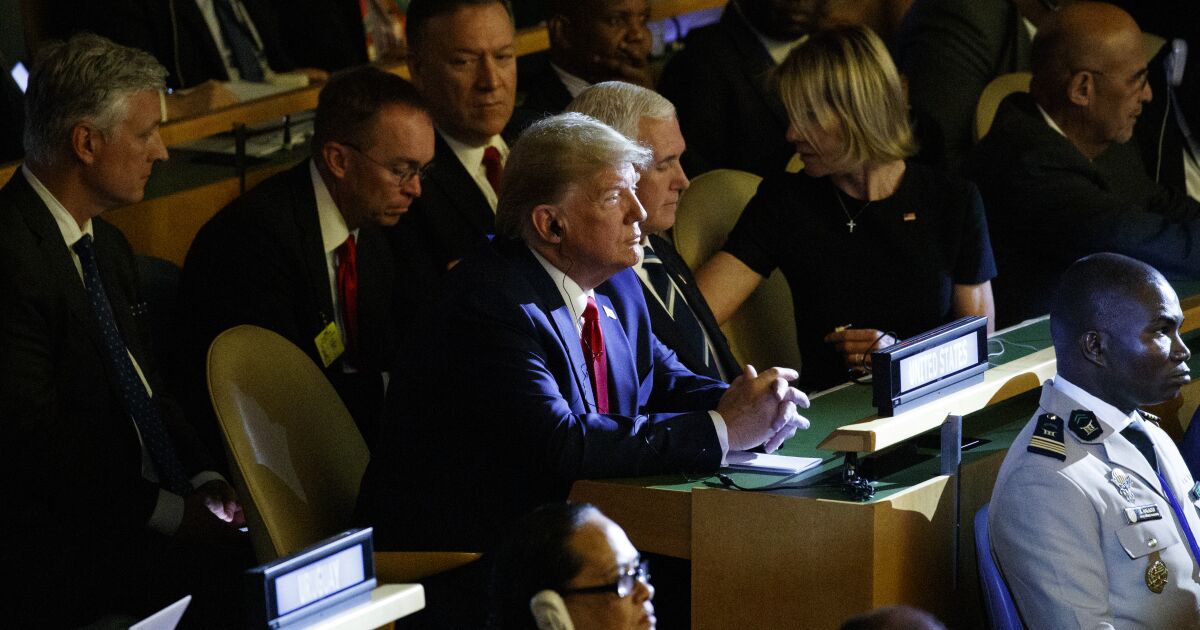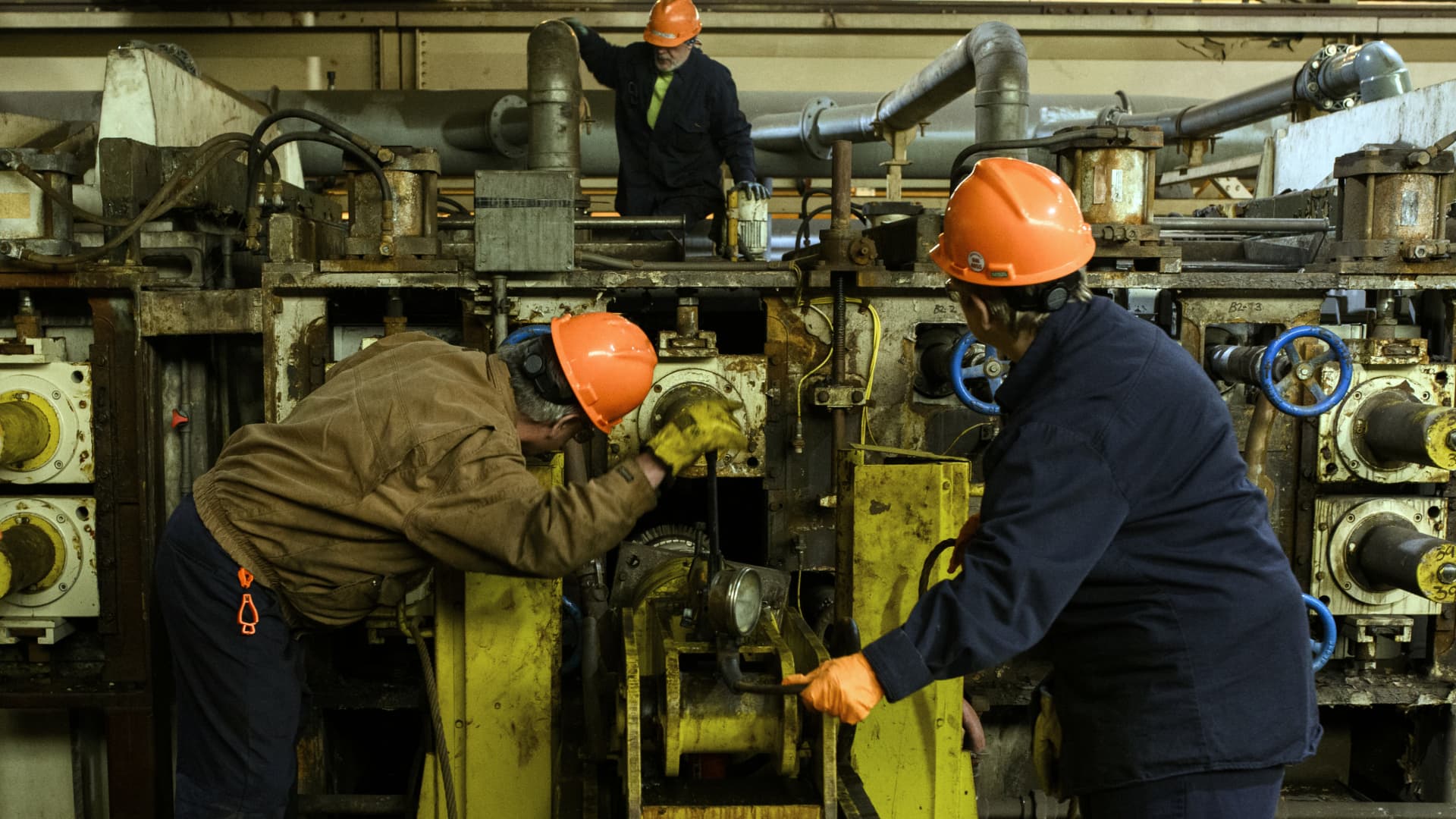South Africans are struggling with crippling power cuts on a daily basis, which are imposing huge costs on business. As the country’s grape harvest gets under way, there are fears about the impact on the wine industry.
The rumble of tractors, the churning of the wine press and occasional bouts of laughter from the farm workers provide the soundtrack to the busiest time of the year for the Groote Post vineyard.
Everyone is active as the picking and processing of the grapes begin at this winery in the picturesque town of Darling, less than 80km (50 miles) from Cape Town, in the west of the country.
Bunches of dark pinot noir grapes lie in wooden pallets stacked next to the wine press. A fork-lift truck tips a pallet into the press, releasing a sweet odour into the air. I taste a grape, which is smaller than the supermarket varieties, and much sweeter and full of robust flavour.
“In 16 months from now these grapes will be in your glass and you’ll be sipping on some lovely bubbly,” Peter Pentz, Groote Post communications manager says.
And while that may be true, the winemaker will be having a harder time getting it on to tables in South Africa.
The difficulty for every firm in the industry is that this crucial time of year coincides with the worst rolling power blackouts the country has ever experienced.
Not a day has gone by in 2023 without the electricity from the state-run power company Eskom going down. The interrupted power supply is having a big effect on those hoping to make wine.
“As soon as the power cuts, it means that [without a generator] none of the operation can continue within the cellar,” Mr Pentz tells the BBC.
“No labelling can continue, no bottling and [no] cooling. Especially in the harvesting season it’s vital for us to get the fermentation process started.”

This vineyard, like many others in the region, has been forced to invest in a back-up generator, but the exorbitant price of diesel is driving up costs and making it hard for small and medium-sized wineries to survive.
Groote Post is spending around 50,000 rand ($2,800; £2,400) per month on diesel for its generator and the farm still has to spend more on fuel for its tractors.
This is representative of the extra costs facing an industry which has big ambitions to grow.
South Africa is the eighth largest wine producer in the world, generating about $3bn in revenue every year.
Around half of the wine made in the country is exported to overseas markets, with UK drinkers being the largest consumers of South African wine.
Many wineries are exploring opportunities in Asia – exports to China, for example, have doubled in recent years.
But the constant power cuts are slashing growth forecasts.
The impact is being felt across all sectors of the economy. According to global accounting firm PwC, the South African economy could have increased by around 7% – instead of less than 2% – last year were it not for “load shedding”, as the power cuts are known locally.
“This is challenging for us, in fact this is a crisis for us,” says Christo Conradie, manager of wine business at Vinpro, which represents nearly 2,600 wine producers and sellers.
“Power is important for our producers because we need to irrigate, specifically at this time of the season we are looking at the ripening of the berries.
“That’s why we need to have it [power] and now we are sitting with Eskom that can’t supply at an optimal level,” Mr Conradie adds.
Though South Africa’s power crisis is not new, the problems seem to be getting worse.
The country has a fleet of old and inefficient coal-fired power stations that are constantly breaking down. There are two new power stations, but they are not up and running yet and are massively over-budget.
Eskom is expected to impose load shedding on a continuous basis for the next two years while it works on a plan to extricate the country from the crisis.
The wine industry is not being passive in its criticism of load shedding. Representatives are talking with the government and have put proposals on the table.
Mr Conradie says they have drawn up a timetable of when the winemakers need power most – usually in the early hours of the morning and just after lunch – and have asked for the blackouts to be scheduled around them.
The industry is also seeking rebates for diesel fuel and for the government to remove red tape so there can be more investment in solar and other alternative sources of power.

Load shedding during the harvest season will exacerbate the situation for battered winemakers which have been lurching from one crisis to another.
The wine industry was just starting to make a comeback following a tough period during the Covid-19 pandemic. Alcohol sales were banned in South Africa during the height of the health emergency and domestic wine sales dropped by 20%.
This year’s crop is set to be smaller than that of 2022 due to unfavourable weather conditions earlier in the season.
To try and alleviate some of the pressures, the department of agriculture last month set up a task team to monitor the impact of load shedding.
“Technical work to measure financial costs is under way and will help to underline the strategy,” says department spokesperson Reggie Ngcobo.
But when that strategy emerges is hard to know.
Nevertheless, back at the Groote Post vineyard, work continues despite the challenges.
There is a resilience and defiant optimism. Mr Pentz is proud of the wines they produce and the way that they can touch different parts of the globe.
Holding up a fat bunch of grapes he says: “It’s amazing to think that we start off from this, and we end up with someone, somewhere in the world, sipping on some grapes coming from South Africa.”















